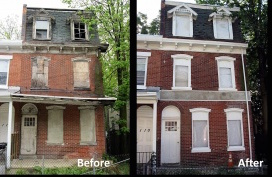 Researchers at the University of Pennsylvania have published a study that found that efforts to upgrade abandoned buildings in inner cities can have a dramatic effect on reducing crime in these areas. The “broken windows” theory holds that abandoned buildings send a signal to offenders that it is acceptable to commit crimes.
Researchers at the University of Pennsylvania have published a study that found that efforts to upgrade abandoned buildings in inner cities can have a dramatic effect on reducing crime in these areas. The “broken windows” theory holds that abandoned buildings send a signal to offenders that it is acceptable to commit crimes.
In 2011, the City of Philadelphia passed an ordinance that required owners of properties to install working doors and windows on abandoned buildings. Researchers found that of the 2,356 buildings cited by the Philadelphia Department of Licenses and Inspections, 29 percent complied with the ordinance between January 2011 and April 2013. The team then compared the number of reported crimes and acts of violence at these “treatment” sites, where abandoned building owners had complied with the ordinance, to sites that had not complied, within one-half of a mile. They found that crime rates were down in the areas where buildings had been renovated. The most significant reductions came in gun-related violence.
John MacDonald, a professor of criminology at the University of Pennsylvania and a co-author of the study, stated that “replacing broken windows and doors is an effective deterrent of crime — and a low-cost alternative to demolishing abandoned buildings. During a time when big cities like Philadelphia are looking to tackle issues of crime and violence, this study points to a potentially effective tactic for municipalities to continue or implement in helping make their neighborhoods safer and ultimately improving health outcomes.”
The study, “A Difference-In-Differences Study of the Effects of a New Abandoned Building Remediation Strategy on Safety,” was published on the website of the journal PLOS ONE. It may be viewed here.










